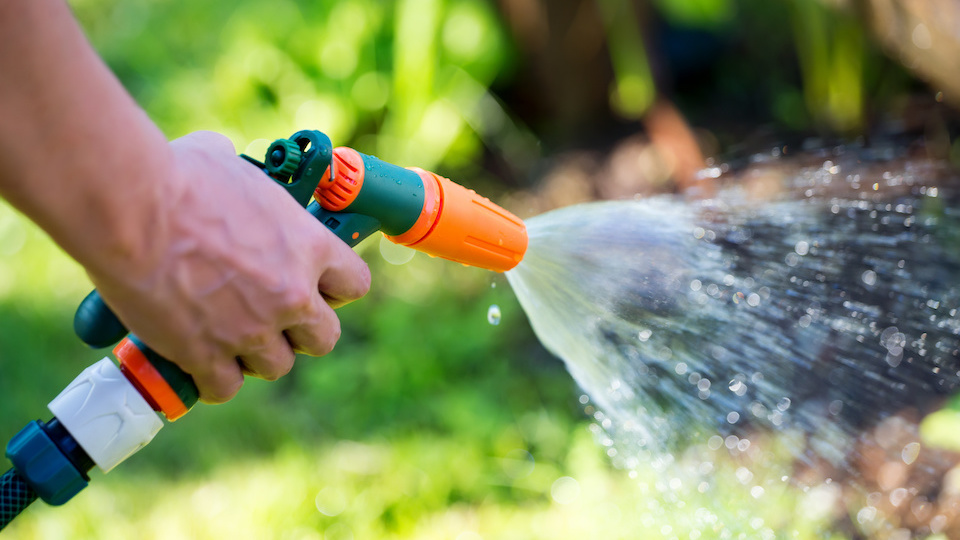Garden irrigation is one of the most challenging areas to master. You don’t want to water too much, but you also don’t want to water too little. And solely relying on rain is usually not an option in most climates. A lot of people simply give up and water whenever and however they feel like doing it. Unfortunately, if you don’t make an effort to water properly, you’ll be shocked by your bill at the end of the month. Most gardeners on metered water systems are always looking for ways to get the most bang for their buck and keep their plants hydrated and happy without breaking the bank on the water bill. Here are a few helpful ways to do just that.
Install a rain barrel
Utilizing a rain barrel (or five) in your garden can be one of the best ways to irrigate with clean, chemical-free water that doesn’t cost you a cent. Installing a rain barrel is easy, and it can be hooked up to your existing irrigation system, or you can use a simple gravity-fed hose to keep your plants watered and happy. Instead of letting all of that precious rainwater go to waste, store it up for a not-rainy day.
Adjust your sprinklers
If you water your lawn with an automatic sprinkler system, you may be surprised to realize just how much water you’re wasting by drenching the sidewalk or your fence. Take some time to fiddle with the settings on your sprinkler heads and adjust them until they are only watering your yard. Though it seems simple, this could save you hundreds of dollars over time.
Water deeply
Instead of giving your thirsty plants a 10-second shower every day, water less often and drench them. Not only will this help save you time, but it is more effective since it allows the water to penetrate the soil and reach the roots of your plants rather than just sitting on the surface. Plus, you won’t lose as much water to run off and will encourage your plants to develop deeper, healthier root systems.
Check for leaks
Make it a monthly habit to check all of your hoses, sprinklers, and irrigation systems for leaks. Even a small, constant leak can hike up your water bill and cause puddles, mud, and erosions in your yard. Check your sprinklers for any jammed, broken, or buried heads and make sure that your hose isn’t leaking at the faucet.
Water at the right time
Unless you’re a newbie gardener, you probably know that you shouldn’t water your crops in the heat of the afternoon. The water simply evaporates without actually hydrating your plants. Instead, water early in the morning before the ground is warm.
Utilize mulch
Mulch is an incredibly powerful tool, and though it may not seem like it has a lot to do with watering, it can actually save you a ton of money and keep your plants healthier too. Laying down a think layer of mulch prevents a lot of weed growth, keeps your plants insulated, and traps in moisture so that you don’t have to water as much. Plus, it just makes your garden look tidier and more put-together.
Don’t water the leaves
Though it is far easier to turn on a sprinkler and walk away, traditional sprinklers aren’t exactly effective for watering crops or flowers. While they may work for laws, they simply get the leaves wet in your garden. Not only is this a waste of water, but it can also lead to issues like sunscald and fungal diseases. Use a drip irrigation system or simply water by hand. You’ll save on your water bill, and your plants will be happier.
Keep an eye on the weather
There’s nothing worse than spending time watering only to have it rain a few hours later. Keep an eye on the weather and if it seems like it is going to rain, turn off your automatic sprinklers and avoid manually watering your garden. Enjoy your day off and don’t water for a few days after heavy rain.
Avoid overwatering
Many gardeners are afraid that their plants aren’t getting enough water so they go to the other extreme and do something just as detrimental…overwatering. Before you water, test the soil by sticking a chopstick, or another tool into the ground to check for moisture. If it goes in easily, you don’t need to water, simple as that. If it’s difficult, then it’s probably a good idea to grab the hose. Use your discretion when it comes to watering and err on the side of underwatering. Plants hate sitting in water and often have difficulty recovering from persistent overwatering.
-Susan Patterson




